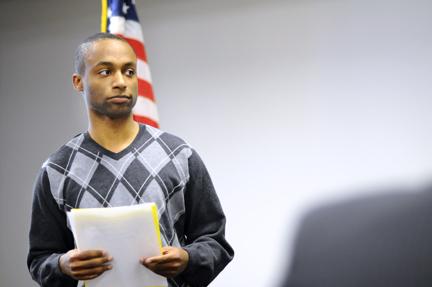Members of Student Senate heard discussion and argument for several pieces of legislation Wednesday in the bi-weekly Student Senate meeting and approved the Student Government Mission Act, the Spring 2009 Appropriations Act and multiple acts regarding the upcoming student elections process.
The most contentious legislation discussed and passed in Wednesday’s meeting centered on the student body elections process, which begins in March.
Student Senate passed the Clean and Fair Elections Act, which attempts to continue improvement of the elections process, and the Spending Limits Act, which increases the spending limits for the campaign process.
Andrew Tucker, the Elections Commission Chair and a senior in political science, said the two pieces of legislation passed Wednesday will make the elections process fairer and more transparent to the student body.
“This bill really does three things,” Tucker said. “It closes up loopholes in previous elections, adds more oversight to the candidates’ spending limits and makes the entire process more electronically accessible for students.”
The bill raised the spending limits for those students running for SG office. The limit for Student Body President rose from $450 to $625. The bill also has a provision that allows for limits to change if all students running for a particular office agree to a higher of lower limit.
Student Body President Jay Dawkins, a junior in civil engineering, said the legislation passed regarding the SG elections process is a step in the right direction as far as keeping track of spending.
Dawkins also said the increase in limits coincided with inflation since the last increase, which took place in 1999.
“It’s pretty reasonable for the limits to go up that much,” he said. “Considering it’s been about 10 years sincet the statutes were at $450 and considering the changes that have happened since then, it seems like the best move.”
Tucker said an important part of the Clean and Fair Elections Act will be available on the SG Web site.
“The weekly expense reports filed by all the candidates will be available online,” Tucker said. “Whenever your financial records are publicly available there is more accountability and it makes the process more translucent.”
Dawkins said the Clean and Fair Elections Act will allow the Elections Commission to enforce loopholes existent in the process prior to this year.
“The Clean and Fair Elections Act gives a lot more power to the Elections Commission,” he said. “In the past, there was a lot of pressure to not disqualify someone or not fine someone because the rules were so vague. Now it’s very directive. I think you will see a lot more of the rules enforced this year.”
The Appropriations Act, which SG also passed Wednesday night, allocated more than $40,000 to student organizations who requested funds.
Although the groups requested more than $100,000 total, Student Senate President Pro Tempore Kelli Rogers, a junior in political science, said there is only so much money that can be given out.
“I was disappointed we didn’t have more money to give out but we did the best we could,” she said. “There is only so much we can do. The committee pulled an extra $250 from our own committee [budget] line item so we could put extra money in [appropriations].”
Rogers said the spring Appropriations process came under much more scrutiny due to the University’s budget problems.
“We were under extra pressure because of the budget cuts and because of Dr. Stafford’s oversight of it,” Rogers said. “The committee took extra steps to be fair and not be wasteful. The bill passing without any huge debates or huge amendments shows that all the time the committee put in was for good purpose.”
The SG mission, which became officially codified Wednesday night with the passage of the Student Government Mission Act, makes official the goals of the organization.
According to the bill, SG will engage students to gauge the concerns of the student body, promote an environment of open discourse and proactively represent the student voice to administration and the Board of Trustees.








